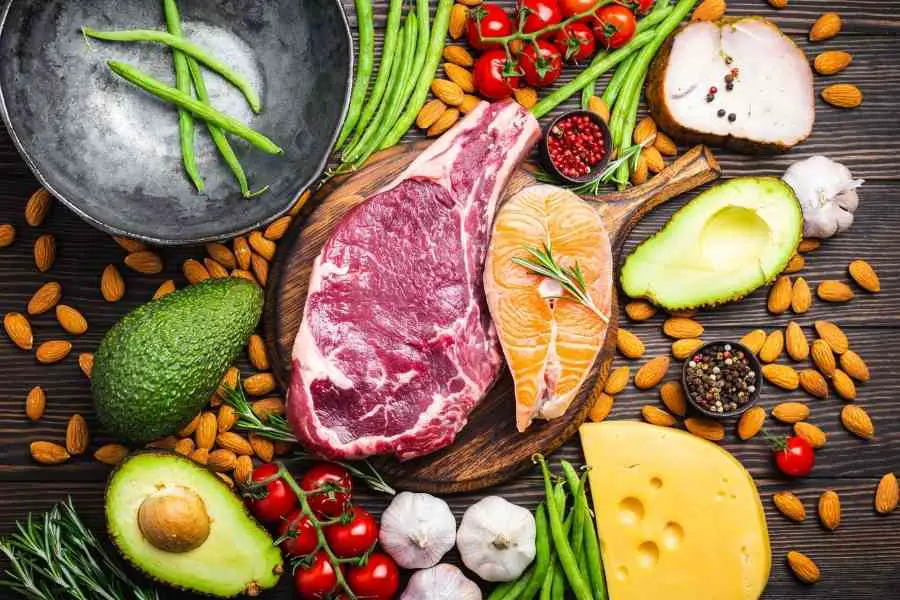
Friends of the whealth flower
This is a post from our guest post series where we welcome friends to The Whealth Flower to share their amazing and inspiring stories about weight loss and self improvement.
Today I am super excited to welcome my friend, Ash, who lost 60lbs by adopting the Keto diet….
Thanks Catherine for letting me share my thoughts, feelings and experiences with the Keto diet. Here’s how I lost 60lbs by going Keto….
My Weight Gain Story
Gaining weight was a gradual thing for me. It kind of crept up and me like it often does as we hit middle age (I am 35).
I am naturally slim and my normal weight is around 12 stone (168 pounds) – so fairly typical for a male.
This is a weight I had held for around 15 years, but by age 33 I had definitely “let myself go” a bit (or a lot depending on who you asked).
I was working a lot (in construction) and eating a lot of convenience foods such as take-outs and microwave meals when I arrived home from work.
My eating habits revolved around getting a quick carb fix and then putting my feet up in front of the tv – rinse, repeat for 7 days a week with very little physical activity outside of work.
I knew I had stacked some weight on since I hit 30, but I never actually took the time to weigh myself.
I didn’t even own a set of scales.
It was only during a GP appointment when I was weighed that I realized I weighed 250lbs (almost 100lb above what I would call my normal weight).
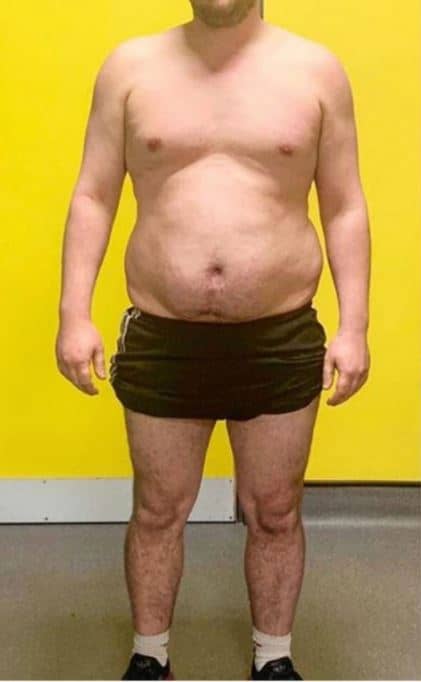
The reason I visited my GP was because I had started to feel like things weren’t quite right over the course of the previous 3 months. These were:
- I was needing to urinate up to 20 times a day
- I was constantly hungry
- I was extremely fatigued
- I had an unquenchable thirst that I could never seem to satisfy
I told the GP these symptoms and he immediately said he wanted to take a blood sugar reading.
I knew this didn’t sound good and diabetes was the first thing that came to mind.
My blood sugar test was done over the course of a week where I had to fast for 8 hours and then return to the GP for my bloods to be taken.
I returned later that week and was told that my blood sugar reading was 120 mg/dL and this meant I had pre-diabetes.
A reading above 125 mg/dl is type 2 diabetes, so it just shows how close I was to being diagnosed as diabetic.
My first impression was one of astonishment!
I thought diabetes was for people who are seriously over weight and for 40+ somethings (not 33 years olds with a bit of a belly).
My GP gave fairly generic advice to change my diet and be more active. He suggested I lose 60lbs as a target weight.
He said that he would test me again in 6 months time.
This page contains affiliate links. Specifically, we are affiliates of Avocadu meaning we earn a small commission if you go on to click our link and make a purchase from them. See our disclosure policy for further details on how this site makes money.
What is the Keto Diet and why did i choose it?

When I received this bad news from my GP I was adamant that I wasn’t going to allow myself to develop type 2 diabetes.
Diabetes is a chronic condition which can wreak havoc on your body and lead to heart, brain, kidney and even eye damage including blindness.
Diabetes and even pre-diabetes is essentially where your body becomes resistant to insulin which causes your blood sugar to become unregulated.
So I started to look for a diet I could adopt that would get my weight down and my blood sugar under control.
I did my own research online and the diet that kept popping up time and again was the keto diet.
The keto (short for ketogenic) diet is one where you restrict the amount of carbs you eat to only around 20 to 50 grams per day.
The rest of your diet is made up of mainly good fats and protein.
Popular keto resources recommend a dietary split of your daily calories as follows:-
- Protein – 10-20%
- Fat – 70-80%
- Carbs – 5 – 10%
how does keto work?
Keto works by putting your body into the metabolic state of ketosis where your body burns fat instead of carbohydrates for energy.
Specifically, ketosis causes your liver to make ketones from fatty acids in your food and own body fat.
These ketones are then used for energy.
Why is Keto Good For Pre-Diabetes and Weight Loss?
The keto diet is a good choice for those with pre-diabetes as it has been shown to reduce blood sugar, improve insulin sensitivity and reduce inflammation.
Keto can also induce rapid weight loss and can be much faster at delivering results when compared to a calorie-reduction diet.
People report, on average, a loss of around 1 – 10 pounds in the first week on the keto diet. The more you weigh, the more you are likely to lose.
If you are suffering with type 1 or type 2 diabetes then it is worth speaking to your GP or nutritionist before starting the diet as there is a risk of developing diabetic ketoacidosis (DKA), a serious condition where ketone levels become too high.
The risk of DKA is more prevalent in type 1 diabetes but there is a risk in type 2 also.
If you are diabetic then your blood sugar and ketone levels may need to be closely monitored if you adopt the diet.
Related Articles:
What I did before starting the keto diet
I read a lot about the keto diet before I jumped in.
It’s important to remember that the keto diet is at the extreme end of the dieting spectrum.
It’s a real commitment and demands real change from you and your body.
I began by reading a lot of scientific articles on keto and quite a few keto journals to prep myself for what was to come.
I also devised a keto diet plan(see below) and used a keto calculator to work out my goals.
The aim of the calculator is to work out your weight loss target and provide you with a guide to reach that target on the basis of the low carb keto diet.
After I had dialed in things like my height, weight, sex, level of activity and calorie deficit, the calculator came back with the following recommendation:-

2101 calories a day didn’t actually seem too demanding.
A man should eat 2500 and a woman 2000, so shaving off just 400 calories seemed very doable.
What looked much more demanding was restricting my carbs to 20g per day.
20g of carbs is the equivalent of one medium sized potato or a handful of pasta.
I was used to eating that many carbs in one or two mouth fulls so I knew straight away it was going to be challenging.
JOIN THE 21 DAY WEIGHT LOSS CHALLENGE
THE ULTIMATE PROGRAM FOR WOMEN LOOKING TO LOSE WEIGHT FAST
✔LOSE 10-21 POUNDS IN JUST 21 DAYS! ✔

We have teamed up with our friends at Avocadu to introduce you to their 21 Day Fat Loss Challenge. A course designed and built by Avocadu’s certified personal trainer and nutrition specialist.
A program with its foundations based on modern nutritional science, it has helped hundreds of people see rapid weight loss results. It will help you:-
- Lose 10-21 pounds fast
- See a 2-3 drop in dress size
- Feel your clothes fitting better
- Lose 3-4 inches from your waistline
- See an improvement in your skin and hair quality
- Feel fewer aches and pains in your joints
- And so much more!
What you can and cannot eat on the keto diet
It’s important to remember that the keto diet is rather strict.
The whole idea is to put your body into a state of ketosis.
If you do anything to prevent that metabolic change then ketosis is unlikely to be achieved and the diet becomes pointless.
It’s therefore important to ensure you know what foods are in and which foods are out.
There is also a distinction to be made between “clean keto” and “dirty keto“.
Essentially, clean keto is a diet rich in nutrient dense, wholesome natural foods that you would typically think of as healthy.
Dirty keto is where you eat more processed fats like processed cheeses and meats which often contain excess salt and preservatives.
My aim from day one was to stick to the natural, wholesome type for the most part.
My dietary change was for the good of my body and I wasn’t prepared to cut out the carbs to then exchange them for more processed fatty foods full of salt.
My recommendation is you do the same!
List of Foods You Should and Shouldn’t Eat On the Keto Diet
Keto is fairly demanding and fussy when it comes to choice of foods, which is perhaps unsurprising as your aim it to significantly reduce your carb and sugar intake.
As you’re probably aware, a lot of foods are made of these substances.
Here’s a non-exhaustive list of foods you should and shouldn’t eat to give you an idea what keto means in terms of food choices.
| Foods You Can Eat | Foods You Can’t Eat |
| ✅ Butter, milk and cream | ❌ Rice |
| ✅ Low carb vegetables – asparagus, kale, cauliflower, broccoli, avocado, cabbage, spinach, tomatoes and peppers. | ❌ Pasta |
| ✅ Cheese (stick to the unprocessed type) | ❌ Corn |
| ✅ Poultry | ❌ Cereal |
| ✅ Red meat | ❌ Oats |
| ✅ Eggs | ❌ Potato chips |
| ✅ Nuts and seeds | ❌ Sweet/white potatoes |
| ✅ Seafood | ❌ Soda and alcohol |
I think identifying non-keto foods is a fairly simple concept.
If you suspect a food has carbs or lots of sugar, then check online – there’s tons of keto resources on the internet you can pull up in seconds.
As a rule of thumb, most grains are off the menu.
Fruits, which are high in sugar, are generally excluded too. If you are going eat fruit then choose the low glycemic ones like blueberries, strawberries and tomatoes but in moderation.
Vegetables that grow in the ground are generally the ones to avoid on the keto diet as they tend to be packed full of carbs.
Legumes are another food type to be cautious of. While they are high in protein, they often contain excess carbs.
It’s also important to watch what you drink. Avoid energy drinks, soda, alcohol and fruit juices – all of which are high in sugar.
Instead, opt for water, black coffee or black tea.
If you do have any doubts about a food’s carb load, then check the label as you’ll be surprised how many foods have hidden carbs lurking in them.
It’s important to remember that the keto diet is not an excuse to load up on unlimited protein.
The diet is mainly fat based!
Only 10-20% of your keto foods should consist of protein.
Here’s the proportions again to recap:-
- Protein – 10-20%
- Fat – 70-80%
- Carbs – 5 – 10%
A typical keto meal plan
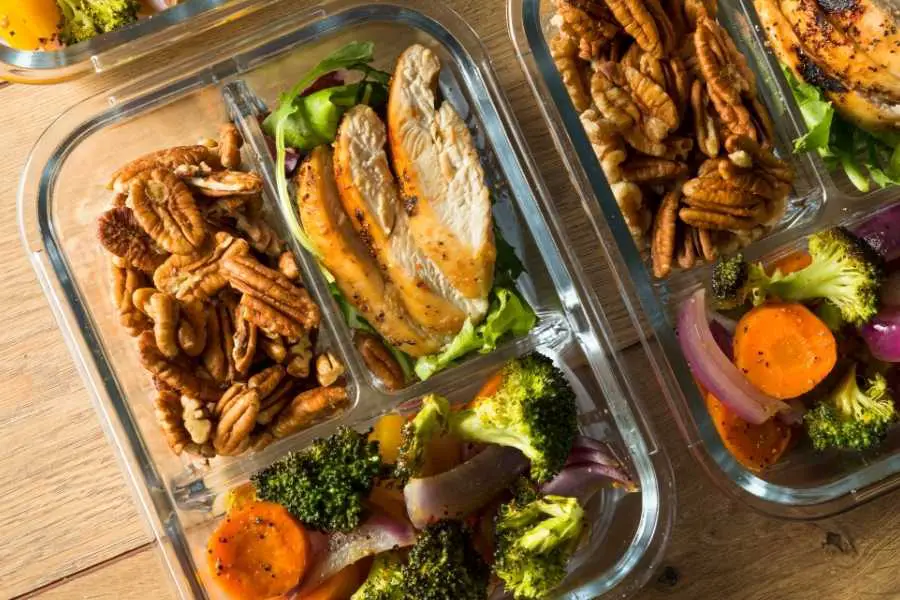
I think it’s important to be organized on the keto diet.
It is a fairly strict diet and you can easily slip up if you don’t have some idea of what you’re actually going to eat.
A meal plan is a perfect way to deal with this issue and it’s extremely helpful when you head to the grocery store so you can target everything you need.
Here’s a typical meal plan I stuck to on the keto diet.
I did actually have 3 or 4 meal plans to vary things up but this was my favorite one.
Day 1
Breakfast – Bacon & egg cup with avocado
Lunch – Tuna salad with boiled eggs
Dinner – Pork chops with green beans
Day 2
Breakfast – Omelet with mushroom, broccoli and peppers
Lunch – Chicken mayonaise salad, with avocado, tomato, almonds and onion
Dinner – Garlic butter steak with mushroom and asparagus
Day 3
Breakfast – Yogurt with keto friendly granola
Lunch – Pesto chicken with mixed leafy greens and avocado
Dinner – Grilled salmon with broccoli and cheese
Day 4
Breakfast – Keto pancakes with berries and whipped cream
Lunch – Italian meat plate with eggs and olives
Dinner – Lamb chops with mint sauce and oven roasted vegetables
Day 5
Breakfast – Scrambled eggs with jalapenos, tomatoes and onions
Lunch – Avocado and egg salad
Dinner – Stir fried chicken, mushrooms, peppers and keto friendly soy sauce
Day 6
Breakfast – Coconut cereal
Lunch – Grass fed beef burger with no bun with salad
Dinner – Rib-eye steak with roasted vegetables
Day 7
Breakfast – Boiled eggs with mayonnaise
Lunch – Keto Caesar salad
Dinner – Beef stroganoff
My experience on the keto diet
I must admit, I was a bit nervous when I started on the diet.
I remember psyching myself up for a good week as I was slightly apprehensive about what might happen.
Restricting yourself to 20g of carbs is no mean feat, especially when you’re used to being a great big giant carb monster like I was.
Despite my doubts, I knew I had to make this change and I dove in (head first).
Days 1 and 2 on the diet were fairly nondescript.
After day 2 on the diet, I didn’t actually feel much different. I began to think, “damn this is fairly easy – what was I worrying about”.
The third day was, again, fairly normal.
Perhaps my body is just made for keto!
But then on day 4, I seemed to wake up feeling really quite groggy, run-down and tired.
My instinct told me this was the start of “keto flu”.
Keto flu is essentially just your body making the transition from burning carbs to burning fat for fuel.
Luckily I didn’t have some of the other symptoms like headache or dizziness but I did feel seriously lacking in energy for about 5 days after coming down with keto flu.
There is a huge temptation at this point to quit the diet – especially when you’re working a physical job like I was and you’re having to muster every bit of energy to do the most simple tasks.
But I knew that this was just a phase of the diet and that with keto the night is often at its darkest just before the dawn.
Within around 5 days, I did start to feel better.
Not only had my fatigue subsided but my clarity of thought also seemed improved.
As the days went on, I started to feel like I had more energy and like I was more motivated.
By around week 3, I also noticed that I didn’t seem anywhere near as hungry between meals.
Before keto, I would have my lunch and then start snacking an hour later. With keto I felt like I could survive on 3 meals a day without much effort.
The best thing was, this new found clarity and energy seemed to continue throughout my duration on the diet.
It was awesome and even more satisfying to me than the actual weight loss!
My Weight Loss On the Keto Diet
My weight loss results were equally as impressive as how I felt on the diet.
Keto is known for being an excellent diet for rapid weight loss and that was pretty much my experience.
I kept a monthly diary when on the diet.
Some may prefer a weekly one but I was a little lazy if I am honest. Here’s my results:-
| Month | Weight loss |
| 1 | 13 lbs |
| 2 | 11 lbs |
| 3 | 10 lbs |
| 4 | 10 lbs |
| 5 | 9 lbs |
| 6 | 7 lbs |
| Total Weight Loss | 60 lbs |
As you can see, my weight loss was fairly consistent in the first 4 months but tapered off towards the end of my 6 month journey as I hit my weight loss goal and came back down to my natural weight.
After 6 months on the diet I weighed 190lbs or thereabouts.
My goal was never to remain on the keto diet indefinitely and I did increase my carb intake after 6 months, albeit not to the levels I was consuming before.
My weight has stayed fairly consistent since that time, at around 190 – 200lbs.
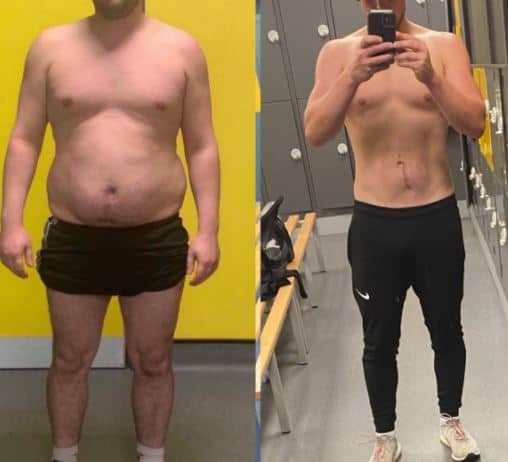
My Trip to the gP
In around month 7, I booked an appointment with my GP to have my blood sugar re-tested.
My GP was blown away by my weight loss result and was extremely pleased for me.
My fasting blood sugar was tested again over the course of a week.
I was then contacted by my GP by phone who told me my blood sugar reading was 95 mg/dL which meant I was now back into the normal range.
A massive relief blew over me.
I was now out of the woods as far as type 2 diabetes was concerned!
What a result!!!
Final thoughts
As my results will testify, the keto diet is a sure-fire winner when it comes weight loss.
And seemingly for tackling pre-diabetes as well.
Yes, it’s extreme and, yes, it is hard work but the results speak for themselves.
However, I do not see keto as a long term diet as I believe it is too extreme to be maintained in the long run.
There is also some evidence emerging that a long term low-carb diet can lead to a higher risk of atrial fibrillation (a heart rhythm disorder) but the science is still in its infancy and no final conclusions have been reached about the long terms effects of these diets.
who should try keto
- Those who want fast weight loss results
- Those who can cope with limited carbs and battling through the keto flu
- Those with pre-diabetes
who should avoid keto
- Those with chronic liver or kidney conditions
- Those with high cholesterol or with heart disease
- Those with type 1 diabetes (those with type 2 should speak to their GP or nutritionist before starting)
- People who have gallbladder problems or have had it removed
- People with thyroid disease
PIN IT FOR LATER:-
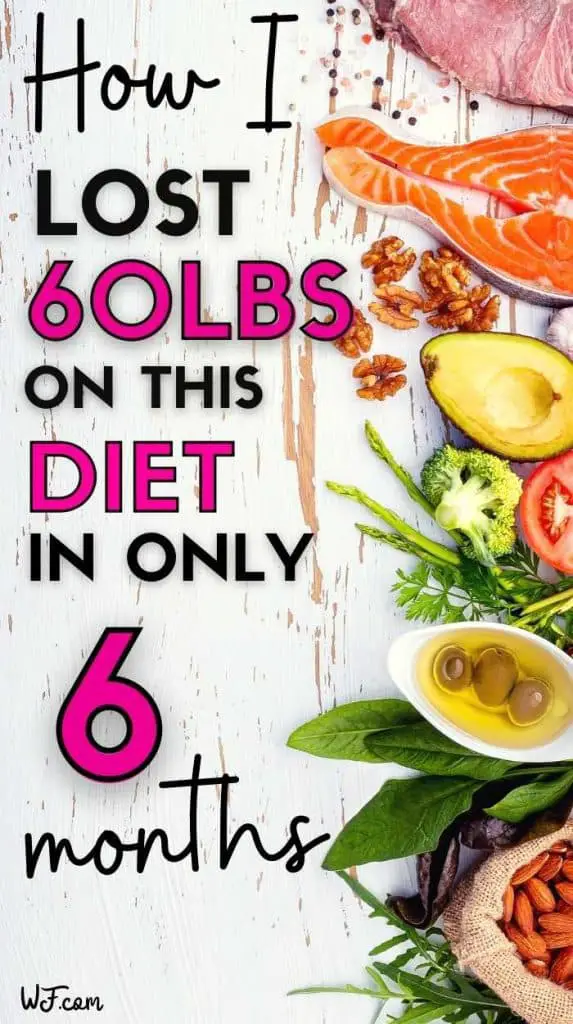

About the author
Catherine holds a bachelor of science degree and is a registered mental health nurse.
She is a self-confessed health and fitness freak, nutrition fanatic and mental health boffin.

